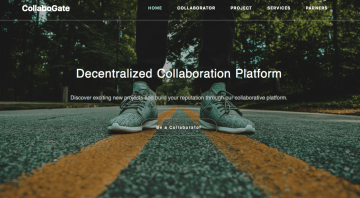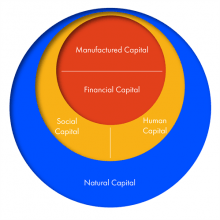
My history and the importance of e-meeting platforms for the blockchain community
When I began my own business, I realised that I had to change my working style. My first challenge as an entrepreneur, was completely unexpected, and it led me to experience a kind of roller-coaster, which I am still living! On the other hand, I was experiencing ongoing discovery and excitement every day.
When I made up my mind about what my business would be, I began acknowledging the importance of community empowerment, which is, I believe, a key factor for business growth. In order to meet people and businesses with similar interests worldwide, I decided to develop a social media momentum. What I had in mind was to meet and grow my followers and develop my communication channels with as many people as possible. In the blockchain community, business networking tends to happen more online, as it takes a step forward from more traditional methods of networking. Meeting online (what I call “e-meeting”) is borderless, interest-driven, and efficient. In addition, e-meeting has the potential to break all kinds of silos, such as different backgrounds, geographical locations etc.
The reason I became so passionate about the advantage of forming online meetings (e-meetings), was because I could see these as holding immense opportunities, regardless of geographical location and/or background. Even if you are living in an Asian country, you can contact with western people with similar interests.
Community Definition and Collaboration
I feel one of the best achievements of the Internet is the way it fosters a more connected society, that helps businesses move towards more international inclusion. However, there are still some barriers making people apart from each other, and living/working in separate communities. We tend to gather ourselves according to various characteristics, such as our occupation, gender, city, nationality, and what type of business we run. To find and join groups of people who share similar interests, is just natural. I call this phenomenon “vertical communities”. In these, people connect through a single interest, and tend to be less open-minded to newcomers. The main feature of a vertical community, is to strengthen the relationships in the inner circle and make tight bonds for future developmental goals.

I do feel though, that in terms of business, single focused business networks, prevent the access to new opportunities and hinders possibilities of expansion. For people with a more open and ambitious mindset, vertical communities might feel a bit awkward. A positive trait of vertical communities is that they can help achieve capital goals. On the other hand, these are not so effective in developing a more collaborative approach to business.
Vertical Community
An open mindset is essential for practical collaboration. The Internet unlocked and opened new avenues to the expansion of regional economic sectors. These tended to have an hard time going abroad in order to start new international business ventures. From a marketing perspective, distributed networks disrupted the single channel concept. Instead of the traditional segmentation between online and offline marketing channels, we find these two channels now seamlessly connected to each other.
The traditional understanding of community also experienced disruption, and became more open to new models that foster collaboration worldwide. I define here “Horizontal Community” as a certain type of community where collaboration is a fundamental value.

Horizontal communities are not an alternative to vertical ones. They are simply an additional channel to every vertical community, alleviating the friction between vertical communities and accelerating peer to peer access to both.
This concept is still evolving and it will hopefully find a balance in the future. I can see it spreading everywhere and being adopted to all kinds of situations.
I would like to add that what I call horizontal communities per se, are not disruptive communities, but rather connected communities, similar to what the Internet has brought us so far. Disruption is often seen as important just for the sake of innovation, but I find co-creation to be a more futuristic and interesting challenge which will grow in the upcoming decades.
Collaboration and Blockchain
Blockchain is a technology that fits any kind of purpose and intention to attain specific goals. We sometimes confuse technology and purpose as being the same, and this applies also to blockchain, which tends to be equalised as “purpose”. I do not wish to deny by all means the power of the technology to foster a specific purpose. But technology is just a technology, ie a tool that allows us (and society) to reach a specific purpose. This needs to be stated clearly, otherwise we lose the control of what is going on.
Whenever we speak about blockchain, we call it a “decentralized” technology, define it as being something that connects spontaneously, and seeks consensus. From my perspective, consensus is one of its key characteristics, and it reinvents and mimics a human relationship. This is the reason, why we are so excited with this new technology.

According to Forum For the Future, five capitals exist in the market, which are very useful for a smooth business communication. These are: manufactured, financial, social, human and natural capitals. Human capital and social capital are particularly separated from the natural capital. On the other hand human capital and social capital are profoundly intertwined in a web of mutual relationships. A proof of this is how awkward we find it to combine human relationship and capital value. A good example illustrating this analogy is the influencer in is a symbolic identity. The influencer can be seen as human capital , like an incarnation of the advertisement channel which exists in the capital market. So an influencer holds a very strong human capital and as well a capital market, due to its important role as an advertiser.

As I mentioned previously, human capital is not always connected to natural capital. Blockchain technology can help making that connection by paving the supplement way, by tracking performance and genuine contribution. For example, when you are contributing to specific project by your own voluntary effort, this can remain as a record on the blockchain, as a memory how your contribution really happened and led to the success of a project.
Plus, if its the technology that proves your credit instead of a third party, collaborative activities become more familiar and safe, for example among enterprises and startups.
For this purpose, I began my new project, CollaboGate, a decentralized collaboration platform, where the experts gather and connect for developing projects together.
We are not just encouraging and helping project makers, but leading and experimenting with new working styles for individuals, by establishing their own unique profile and business identity in between social capital and natural capital. Until now, the value of the social and real market are not correlated, and evaluated from a market demands perspective. My project aims to create seamless pipelines and accelerate human based collaboration worldwide.
I believe that blockchain is the future development and database infrastructure of our current period of a diversified capital society. I thus believe in the essence of its decentralized potential, and aim to help attaining it through global collaboration.



























